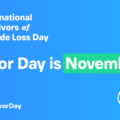
Recently, a friend of mine experienced a suicide loss. This was the first time that I had someone close to me lose someone in the same manner that I lost my dad. While I am constantly entrenched in suicide both personally and professionally something made this loss different. It hit close to home. A dear friend of mine called to tell me the news asking, “What can I do?” For the first time, I was at a loss. I thought about it and told her, “Just be there. Listen. Offer your shoulder. Don’t try and make it better, because you can’t. Most importantly…be there when the rest of the world moves on.” I wanted to hear from others, so I asked our online community what they would tell someone who recently lost a loved one to suicide. The answers were amazing. I wanted to share them with you all.
Advice from Survivors to Survivors of a Suicide Loss
“Do not define their life by how they died, rather by how they lived and loved.” -Laura
“Remember to find the love. In anything, anywhere, everyone…. just don’t lose hope in love. It’s always there; love conquers all.” -Olenaggie
“Allow yourself to grieve however you want.. Everyone does it differently. And don’t ever feel bad about talking about your loved one, even if it’s about the manner they died. Remember, they did not kill themselves., an illness killed them.” -Courtney
“Write to them, and say what’s on your mind even if it makes zero sense. I keep an ongoing letter to my sister, it’s pretty long at this point, some days it’s several pages and some days it’s just a sentence or two. I think it’s helps me to stay connected.” -Angela
“Breathe, scream, cry, breathe, breathe, then repeat….it takes everything you have to breathe and to even fathom the depth of your inability to understand what has happened….my mind wants to know what was going through his mind, how could he do it, was he scared, he was alone, resigned, a burden….it just goes on and on…just keep trying to get through every minute of every hour of day….just breathe and remember your deep love for them.” -Sandy
“Take care of you. Grief after suicide is deeply emotional and physical. Your body goes into ‘fight or flight’ mode your digestive system slows and you have no desire to eat. You need to eat ‘take care of you’ try to eat small amounts regularly, eat food that is easy to digest like soup or protein shakes. When the waves of grief are at their heaviest, tears, anxiety, guilt and fear try to concentrate on your breathing, breath in through your nose and exhale out of your mouth, count to three breathing in an count to four breathing out, making your exhalation longer. Breathing exercise does really help. Emotionally, suicide tears you apart, remember it was not your choice or your fault it was their own choice, their free will. Seek counselors you will need professional help to move forward. Don’t give up on counselors try different ones until you find the one that suits you. Take care of you.” -Jeanette
“It’s not your fault. It is never about you. It is always about the hatred they feel against themselves. It’s NOT your fault. You’ll never see the signs until it’s over, because our brains will need to find the signs. It’s not your fault.” -Unknown
“It’s ok to not be ok, it’s ok to not understand what emotions come up.” -Jennifer
“Breathe. Don’t ever blame yourself. Sadly, you are not alone. Most of all, they never truly leave your side.” -Amy
“Don’t let anyone make you feel bad for grieving. Sometimes you can’t even go day by day, you have to go minute by minute. You will feel better one day, you really will.” -Ketty
“You find little bits of Joy that are still left in this world. Continue to love them but make sure you love yourself. There will be days you hate but make sure you love other days.” -Liz
“You will grieve forever. That sounds awful but grief changes. At first, you’ll be mad and confused. Then you might blame yourself or someone else. Eventually, you will find comfort in the good memories you do have. You will still miss them, but the good days will eventually be more frequent than the hard ones.” -Samantha
“It’s okay to not be okay. Speak their name – how they died does not define who they are. Don’t be afraid to say the word; suicide is not a bad word and death by suicide does not make them a bad person. Lean on others who can relate, others who have experienced the same type of loss. Don’t let anyone make you feel like you should be “over it.”” -Lisa
“Talk about them, talk to them, talk to someone qualified to help you, reach out to social media groups, don’t hide, give yourself time, allow yourself to grieve how you need to regardless of what anyone says, and most importantly know you are not alone!!! This grief is tough, it’s raw and devastating like no other, it’s ok to cry and be mad and any other emotion out there especially allowing yourself to be happy, being a survivor of suicide loss is messy and it’s ok to be a wreck!” -Ashley
“Breathe. Surround yourself with loving people. Sleep, cry, scream. It actually helps. Don’t try to understand- what your loved one did was to end their pain, not to hurt you. Do not blame yourself (that is really hard as we always want to blame). WHEN you are ready, seek out support groups specific to suicide survivors. Get counseling as soon as you can.” – Deborah
“t’s ok to be mad. Mad at them or just mad in general. Just because they’re gone doesn’t mean, it takes away your right to be mad at the actions they took.” -Jamie
“Let people help you. Say your loved ones name. Speak of them. Share stories. Reach out to a suicide support group in your town. Don’t feel afraid or guilty to laugh. Do at least one thing a day for YOU…..eat, nap, shower, color or whatever fills your cup.” -Robin
“You did not cause this. This is not a reflection of how they felt about you. They did care about you. However you feel is normal, as long as you are taking care of yourself you are doing your best. Drink water. Eating and sleeping may take a while but you need fluids.
Stay connected with people you trust, and let them help. Even if at first it’s just with cleaning dishes and bringing cups of tea! Find other suicide loss survivors when you’re ready. We can provide lots of help, practical and emotional. Stay away from people who belittle your grief, or place guilt and shame on your loved one. Seek out people who actively listen and meet you with respect instead. Your loved one’s death does not define who they are. It was one moment in a lifetime worth of moments, so take time to remember and talk about the other moments too. Even if it may help to care for others, make sure to save some energy for yourself as well. You can survive this.” -Kat
“Take a deep breath. Take in what you can for the moment, then remember to breath again. Deeply. Don’t make any serious or rash decisions about anything right now. Take the day one minute, one hour at a time. Allow yourself to feel. Be patient, kind, and good to yourself. Talk to others who’ve been where you are now. Don’t try to figure things out right now, they’ll be plenty of time for all that later. Reassure yourself that you will be o.k . & that it’s o.k. to hurt. Don’t forget to breath.” -Kenneth
“Time does not heal the pain but it does, eventually, ease the pain. Let the waves of grief move through you- don’t try to avoid the feelings. Get help when you need it.” -Sheri
“Seek counseling, whether you think you need it or not, you will have a lot to work through over a long period of time. The grief will be like a storm, the waves will hit hard, but you will have a break between waves and eventually the waves will be further apart, you just need to ride each wave as they hit, one day at a time.” -Anne
“The way they died does not define them as it was a moment in time. Honor their life and the love you shared. Feel everything and never apologize. You will lose friends and family members and gain new friends in the most unexpected places. I turned to my spirituality to help navigate the grief. They remain with us and trust in the signs and synchronicities. Don’t say died by suicide, say died by depression. It’s okay to be mad and angry but this was never your fault. You will gain a compassion for others you never thought possible. Use that compassion to reach out to someone who may be struggling. Even if they ignore you, they will remember who tried.” -Annemarie
A huge thank you to those who took the time to respond. Your words are inspirational, and offer hope to many.




As a suicide of survivor, what I’ve needed most is to share my grief at the enormous loss of my sister. A co-worker asked me to coffee and in the conversation, she began to understand my loss was due to a suicide. I had no intention to share this detail with someone who didn’t know my sister…she was too special to end up being someone’s gossip but my friend’s genuine compassion relieved a mountain of physical grief. My friend always asks about me and my brothers…how we are doing. She allows the conversation to go where it goes…she listens, without judgement, she listens and I can see she cares about my sorrow. If you want to help survivors of suicide loss…just listen. Open up your time and be there to listen. And when there are now words from the broken person, just be there anyway.
I started to journal how I felt when my son’s father died by suicide. Writing down how I felt allowed me to get those feelings out and was extremely cathartic. My son also went to a grief camp support that was SO important after his father died. When we aren’t allowed and encouraged to talk about someone special who has died, no matter how they died, we can’t heal. I will forever be grateful to that group for providing me assistance when I had no idea what to do. I just kept writing as our journey evolved and it eventually turned into a book! I now have a happy, healthy teenager and we talk about his dad often. My son knows nothing is off limits and he can ask me anything.
I lost my oldest son to suicide on Jan 1 2017.my hearts broken.He was 22.started grief share it helps want live again.